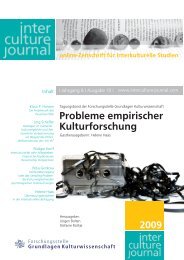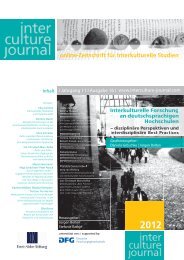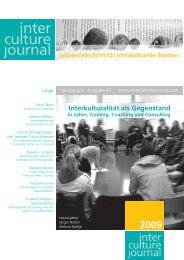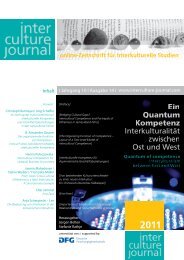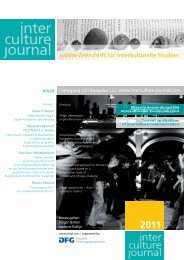Interkulturellen Kompetenz forschung - Frankfurt School of Finance ...
Interkulturellen Kompetenz forschung - Frankfurt School of Finance ...
Interkulturellen Kompetenz forschung - Frankfurt School of Finance ...
Sie wollen auch ein ePaper? Erhöhen Sie die Reichweite Ihrer Titel.
YUMPU macht aus Druck-PDFs automatisch weboptimierte ePaper, die Google liebt.
Gröschke: Gruppenkompetenz in interkulturellen Situationen<br />
Literatur<br />
Abelson, R. P. (1976): Script processing in attitude formation and decisionmaking.<br />
In: Carroll, J. S. / Payne, J. W. (Hrsg.): Cognition and social behavior.<br />
Hillsdale, N.J.: Erlbaum, S. 33-67.<br />
Ancona, D. G. / Caldwell, D. F. (1992): Bridging the Boundary. External<br />
Activity and Performance in Organizational Teams. Administrative Science<br />
Quarterly 37(4), S. 634-665.<br />
Baitsch, C. (1996): <strong>Kompetenz</strong> von Individuen, Gruppen und Organisationen.<br />
Psychologische Überlegungen zu einem Analyse- und Bewertungskonzept.<br />
In: Denisow, K. / Fricke, W. / Stieler-Lorenz, B. (Hrsg.): Partizipation<br />
und Produktivität. Zu einigen kulturellen Aspekten der Ökonomie. Bonn:<br />
Forschungsinstitut der Friedrich-Ebert-Stiftung, S. 102-112.<br />
Bandura, A. (1986): Social foundations <strong>of</strong> Thought and Action. A social<br />
cognitive theory. Englewood Cliffs, NJ: Prentice Hall.<br />
Bandura, A. (1991): Social Cognitive Theory <strong>of</strong> Self-Regulation. Organizational<br />
Behavior and Human Decision Processes 50(2), S. 248-287.<br />
Bandura, A. (2001): Social Cognitive Theory. An Agentic Perspective. Annual<br />
Review <strong>of</strong> Psychology 52, S. 1-26.<br />
Barthel, E. / Zawacki-Richter, O. / Hasebrook, J. (2007): Betriebliches <strong>Kompetenz</strong>management<br />
bei Individuen, Teams und Organisationen. In: Barthel,<br />
E. et al. (Hrsg.): <strong>Kompetenz</strong>kapital heute. Wege zum integrierten <strong>Kompetenz</strong>management.<br />
<strong>Frankfurt</strong>: <strong>Frankfurt</strong> <strong>School</strong> Verlag, S. 335-362.<br />
Bolten, J. (2008a): Einführung in die Interkulturelle Wirtschaftskommunikation.<br />
Göttingen: UTB.<br />
Bolten, J. (2008b): Reziprozität, Vertrauen, Interkultur. Kohäsionsorientierte<br />
Teamentwicklung in virtualisierten multikulturellen Arbeitsumgebungen. In:<br />
Jammal, E. (Hrsg.): Vertrauen im interkulturellen Kontext. Wiesbaden: VS<br />
Verlag für Sozialwissenschaften, S. 69-93.<br />
Bortz, J. / Döring, N. (2002): Forschungsmethoden und Evaluation. Berlin:<br />
Springer.<br />
Chao, G. T. (2000): Multilevel issues and culture. An integrative view. In:<br />
Klein, K. J. / Kozlowski, S. W. J. (Hrsg.): Multilevel theory, research, and<br />
methods in organizations. Foundations, extensions, and new directions.<br />
San Francisco, CA: Jossey-Bass, S. 308-348.<br />
Chen, G. M. / Starosta, W. J. (2000): The Development and Validation <strong>of</strong><br />
the Intercultural Communication Sensitivity Scale. Human Communication<br />
3(1), S. 1-15.<br />
Combs, G. M. / Luthans, F. (2007): Diversity Training. Analysis <strong>of</strong> the Impacts<br />
<strong>of</strong> Self-Efficacy. Human Resource Development Quarterly 18(1), S. 91-<br />
120.<br />
Deardorff, D. K (2004): The Identification and Assessment <strong>of</strong> Intercultural<br />
Competence as a Student Outcome <strong>of</strong> Internationalization at Institutions <strong>of</strong><br />
Higher Education in the United States. Dissertation North Carolina State<br />
University. URL: http://www.lib.ncsu.edu/theses/ available/etd-06162004-<br />
000223/unrestricted/etd.pdf [Zugriff am 14.04.2010].<br />
73 © Interculture Journal 2010 | 12



